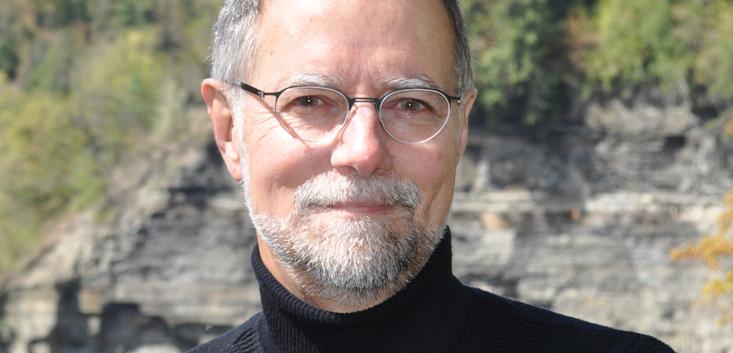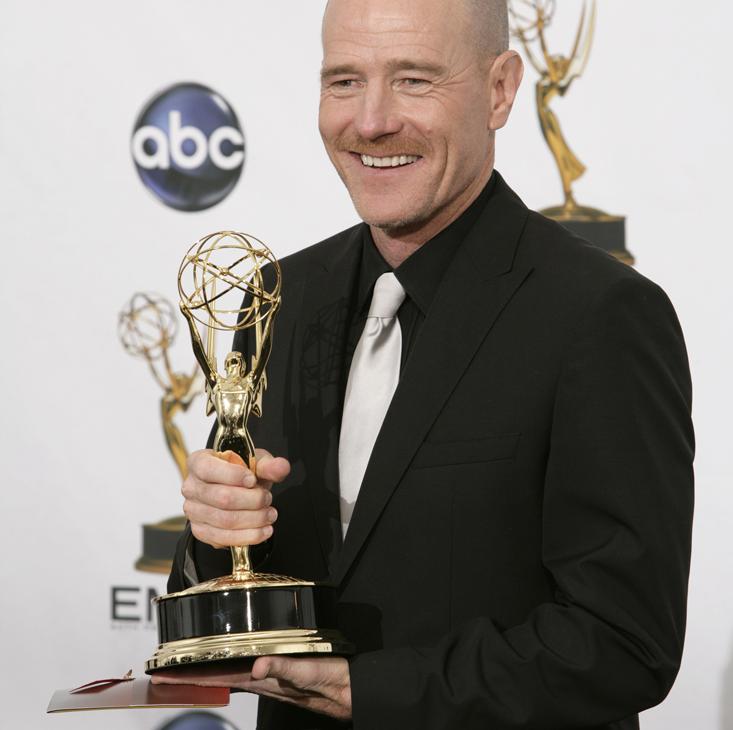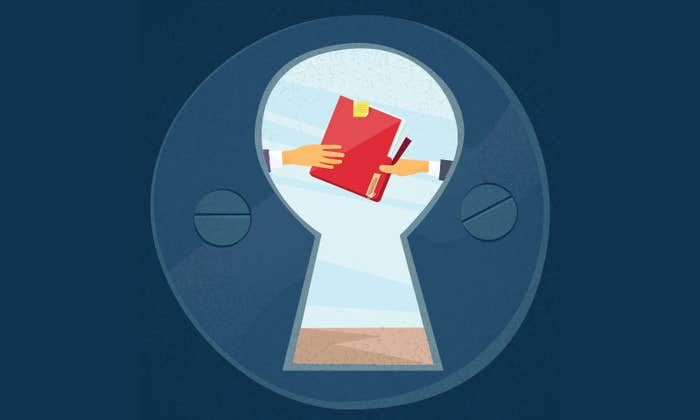Cornell professor of economics Robert Frank says he’s alive today because of “pure dumb luck.” In 2007, he collapsed on a tennis court, struck down by what was later diagnosed as a case of sudden cardiac death, something only 2 percent of victims survive. Frank survived because, even though the nearest hospital was 5 miles away, an ambulance just happened to be responding to another call a few hundred yards away at the time. Since the other call wasn’t as serious, the ambulance was able to change course and save Frank. Paddles were put on him in record time. He was rushed to the local hospital, then flown by helicopter to a larger one where he was put on ice overnight. Most survivors of similar episodes are left with significant cognitive and physical impairments. Frank was back on the tennis court just two weeks later.

Frank says his research ideas often come from his own experience, and his work on luck is no exception. His latest book, Success and Luck: Good Fortune and the Myth of Meritocracy, argues that the role of luck in life, and specifically in economic success, is not as widely appreciated as it should be. The book claims that if the prosperous were more cognizant of luck’s role in their success they would be more supportive of government efforts to spread opportunity, and of the higher taxes they’d have to pay as a result.
Frank’s other writings include the books The Winner-Take-All Society (with Philip J. Cook), The Darwin Economy, and Principles of Economics (with Ben S. Bernanke.) as well as an economics column that has run in The New York Times for over a decade. I spoke to him on the phone recently while he waited for his car to be repaired at a Syracuse dealership. He was warm and engaging and interested in my own experiences with luck and success, answering my questions as if he had all the time in the world.
What evidence is there that people don’t appreciate the role of luck in their lives as much as they should?
If people want to see a vivid example of that, I would steer them to the website that chronicled the reactions of voters to two political campaign speeches in 2012, one by Elizabeth Warren, the other by Barack Obama. The content of the speeches was essentially the same and if you read both transcripts carefully you’d say, “Wow. There’s nothing controversial here.” What each one said in effect was that, in addition to working hard and being good at what you do, if you’re a business owner, also you ship your goods to market on roads that the community paid for, you hired workers that we helped educate, we hired policemen, firemen to keep you safe. So your success such as it is, is a product not just of your own talents and efforts, but it’s a community project.
The reaction was overwhelmingly hostile to the speeches. The people who run businesses seemed to think that Obama and Elizabeth Warren were saying that they didn’t deserve to have succeeded, that they were impostors by occupying these lofty positions that they had won. That wasn’t the message at all, but it was hard for people to hear the totally reasonable and uncontroversial messages of those speeches.
The whole process of constructing life narratives is biased in ways that almost guarantee that people won’t recognize the role of chance events adequately. So, you’ve been successful, you’ve been at it 30 years. It’s true that you’ve worked hard all that time, you got up early, you put in a lot of effort, those memories are all very plentiful and available in your memory bank. You’ve solved lots of difficult problems. You remember examples of those, too. You know the formidable opponents that you’ve vanquished along the way. How can you forget them? So, if somebody says, “Why did you succeed?” those things are going to get top billing in your story.
Maybe there was a teacher who helped steer you through trouble in the 11th grade. You don’t remember that. Maybe you got a promotion early on when one of your colleagues who was slightly better qualified had to turn it down because he had to stay and take care of an ailing parent. You don’t remember that either. Then there’s all this work on the asymmetry of memory.
You’re running into the wind, you’re keenly aware of it every second. You turn the corner and the wind is at your back. That’s good. You like that. But then two minutes into the return course you’ve forgotten completely about the fact that you’ve got something helping you along. Because a headwind is something that you have to work actively to overcome, you almost can’t fail to notice it. But a tailwind helps you along; it’s out of your field of vision mostly. You don’t think about it because you don’t have to think about it.
You argue that income inequality has increased in part due to increased competition and in part due to the role of luck. How so?
The background of that whole discussion is clear evidence that markets are vastly more competitive than they ever have been in the past. What would make a market less than fully competitive? Well, it might be that there’s a supplier that has a prominent local presence. Buyers don’t know about alternative possible sources of supply. And so, they’re, in a way, captive. They’ve got to deal with that seller. Maybe shipping costs are really formidable.
Shipping costs, which are really a metaphor for many, many things, have just fallen across the board. So you think about the value that a product … There’s some interesting data for computers. It used to be that a much higher fraction of the value of a computer was in the materials used to build it. Every year that fraction gets smaller and smaller and a larger and larger fraction of the value of the computer is the ideas embodied in them. Ideas can ship anywhere at zero cost. You don’t need to ship an idea in a shipping crate. You just click your mouse and it goes anywhere. So the fact that you can ship vastly greater value with a given dollar expenditure of freight expense means that the scope of markets has expanded enormously. And that means that many, many more suppliers can compete for any given buyer’s attention and patronage.
Then you have the whole information revolution where if we want something we can search for it online. We’ve got an explosion of options to choose from, from the pop-up and response to the simplest search query. So the idea that you might have a captive consumer that you could exploit in some way as a seller is becoming increasingly a fiction. If you want to find an explanation for inequality or other forms of market failure or other kinds of outcomes that succeed in the market place that you don’t like, the traditional explanation that it’s monopoly or monopsony exploitation just gets weaker by the hour. And there are plausible alternative explanations for that.
And that’s where luck comes in, in addition to talent and effort?
Talent and effort obviously matter, but if you have technology such that you only need one producer from one person in a job slot, say you need somebody to record Bach’s unaccompanied cello suites. How many people do you need to do that? Well, you need a cellist, same as you did hundreds of years ago. It used to be that there was a market for many thousands of cellists because the way that you would listen to those pieces was necessarily to go to a concert hall, and sit there and listen to a live performance. Now most of us who listen to pieces like that, if we do, are listening to a recording of them.
And then, what do we want? Of course, once a recording is made it doesn’t cost anything extra to stamp out copies of it. So if you have a choice between listening to the best cellist perform the piece or the second best, why would you want to listen to the second best? You might be willing to pay a few cents more only to hear the best, because they’re all good. But, even if you’d be willing to pay a few cents more, the fact that there are millions of copies of these things sold means that the fact that the company that bids successfully for Yo-Yo Ma or whoever is regarded as the best cellist is going to get that market all to himself.
And so the price that you have to pay to get the best recording artist is set accordingly. One earns eight or nine figures a year while the cellist who is almost as good is teaching music lessons to third graders in New Jersey somewhere. It’s a dogfight now to see who gets to be regarded as that best performer. The person who is eventually successful got there by defeating thousands, maybe tens of thousands, of rivals in competitions that started at an early age.
And so, if you think about luck mattering even just a little bit in competitions like that—it’s 99 percent talent and effort but luck still matters 1 percent—then, there’s going to be, with that many contestants, a whole bunch of them bumping up against the ceiling on the talent and effort scales. Find the one who’s highest ranked on those scales. Someone will be better than all the others, but there will be a whole lot of people breathing down his neck. There’s one person who’s best, but he’s not best by much because with so many people crowding up against the ceiling on those scales, there’s bound to be a non-negligible number of them who are just within a tiny amount of talent and effort levels of the top guy.
The top guy, if you select only on talent and effort, isn’t going to be any luckier than anybody else. He’ll be average luck. Ok, then find those who are just a hair’s breadth less talented and effortful than he is. And among the set of people in that set, find the luckiest one, and you don’t need a very big set for the luck of the luckiest one to be substantially greater than average, and it’s that person who is going to win the contest most of the time.
So, even if luck counts for only 1 percent, you’re going to see the winners most of the time won’t be the most talented people. Most of the time they’ll be among the luckiest of all the contestants. Let luck count for more than 1 percent, and it’s very easy to construct narratives where it matters enormously more.
Can you give a specific example of how that can happen in practice?
The Bryan Cranston example, I think, is a nice, vivid example.
Vince Gilligan wanted to cast him as Walter White right from the beginning. The studio bosses didn’t want that. It was going to be an expensive production. They were experimenting to see if AMC could carve out a new role for itself in the cable firmament. And so they were going to put a lot of money behind this series and they wanted an A-list dramatic actor. I think at the time Cranston was best known for playing the dad in Malcolm in the Middle, which is a sitcom I never even saw. Apparently he was pretty good in that role, but it wasn’t a leading dramatic role to be sure.
They wanted a more visible, dramatic actor. At the studio bosses insistence Gilligan offered the part of Walter White to John Cusack. Cusack turned it down. They offered it to Matthew Broderick. Broderick also turned it down. I don’t remember which one had the first crack at it. Both of them turned it down. Gilligan went back to the bosses and again pleaded his case. Finally they reluctantly allowed him to cast Cranston as Walter White. And, you know, White was the breakout part of that series. He got four Emmys in the show’s five seasons. He is today one of the very most sought after actors in his age group. But I still wouldn’t have heard of him except that Cusack and Broderick turned the role down first.
But world-class performers like Cranston and Yo-Yo Ma seem like they could be special cases. What about more ordinary jobs? And does the fact that more and more jobs in our economy are service rather than manufacturing jobs figure into the story?
Yes. It’s not a fundamentally different story there. Look at real estate. How much more is a good real estate salesman worth than a bad one? In the old days the ability of an agent to serve clients was much more limited than it is now. Now we have cell phones and websites and all sorts of ways of communicating with potential clients that are vastly quicker and more efficient than the old methods that we used to rely on. Now the person who’s a really good sales person can serve many, many more clients than a good sales person could back in the 1950s. And so the distribution of sales commissions has gotten more skewed accordingly.
If you’re selling children’s shoes and you’re a really gifted sales person, your talent isn’t being very well utilized. If you’re selling securities to sovereign wealth funds, you’re going to make a much bigger difference to the bottom line of that operation. I think there are much better ways of identifying people that are good at doing basic service tasks like these and much more efficient mechanisms for channeling those people who do prove to be good at it into the kinds of tasks where good performance is really worth something economically.
You don’t have brilliant sales people selling kid’s shoes any longer. As far as I know you don’t have anybody selling kid’s shoes. You try them on yourself or you buy them from Amazon.

You propose that we should replace the income tax with a very progressive consumption tax, that would tax spending rather than income and that would collect more revenue overall, in particular from the wealthy. What does that have to do with luck?
I wrote the book and a lot of people find the transition between the luck chapters and the progressive consumption tax chapter jarring. What’s this doing here?
The way I saw it was that the first part of the book tries to establish why chance events are often decisively important and that chance by its very nature is something that we can’t really control. If you can control it, it’s not really chance. The one dimension of things that you as an individual can’t control, so therefore counts as chance on that scale, the most important thing on that scale is where and when you’re born. If you’re born here you’re just so much luckier than if you were born in Somalia.
Choosing your parents, what genes you get, what kind of upbringing you’re going to get, and the country where they live is the hugest dimension of all the chance events that effect outcomes in your life. You can’t affect any of those, but we can affect those. We can make the investments that make our environment one that if you work hard and have some talent you’ve got a reasonable chance to succeed, at least on a decent scale, unlike Somalia where no matter how hard you work and how talented you are you’re not ever going to get anywhere. We could affect that outcome. We can’t do it as an individual, but collectively we could affect that outcome.
So, we are lucky to have been born in the United States, but you’re saying that we could make the landscape even more prone to good luck.
Yes, and the landscape is not as supportive of good luck for people now as it was when I was coming up. I came up in a family that didn’t have much money. I graduated from Georgia Tech debt free. Today to graduate from a good school I’d be $40,000 in debt coming out of college. That’s if I got to college. The poor kids today don’t get to participate in music programs, art programs, sports programs—there’s extra fees for those. There’s this really very grim statistic I mention where if you’re the top scorer in math you’re less likely to graduate from college if you’re from a low income family than if you’re a bottom scorer in math from a high income family.
Plus you believe that wealthy people’s happiness wouldn’t be negatively impacted by higher taxes, since the increase would affect them all similarly and just tamp down on what you call a “positional arms race” in their spending.
I think the term “positional arms race” is an attempt to tie into the metaphor that everyone’s familiar with and regards as uncontroversial, which is the military arms race. A pair of military rivals buys additional armaments hoping to gain an advantage in their contest, but the effect is merely to restore the balance but at a higher level of expense. Neither one is more secure than if they each spent less on armaments and more on schools and hospitals, and everybody would’ve been better off.
That’s why countries sign military arms control agreements. They agree that they won’t build bombs. You need to have inspectors and other enforcement to make those work, but where they can make them work nobody says, “What could the reason for an agreement like that be?” Everybody knows what the purpose of it is.
So my aim was to hijack that familiar metaphor and use it to apply to a class of situations that I think is completely analogous.
Where you see that play out in transparently wasteful ways is the expenses for weddings. Here I don’t think you need to invoke Bridezillas or any other aberrant human forms to see why things have been getting further and further out of hand financially in the wedding domain. The price of the average American wedding in 1980 was $10,000. In 2014, the most recent figure I had, was $31,000. In Manhattan the average was $76,000.
Nobody thinks that the couples that got married paying $31,000 on their event ended up being happier because of that than the earlier couples who’d been spending $10,000. What happened was that the standard that defines “special” escalated between those two dates. Everybody is completely normal to want to send guests away from the event feeling like they had a good time. Everyone knows that if you spend a tenth of what people normally spend on events like that everyone will leave feeling like the event was sub-standard in an obvious way. And so the total expenditure keeps escalating. That’s driven in considerable part, too, by the fact that incomes have been concentrating at the top. So you get this cascade that I wrote about in the book and elsewhere.
That’s wasteful. If all the houses get 20 percent bigger, nobody is any happier than before, especially people at the top. The effect is merely to raise the bar that defines how big you need, at what style you need to be able to entertain in to feel like you’re meeting the social demands of your circle.
Coming back to luck, how much do you think people’s resistance to higher taxes stems from a lack of appreciation of the role of luck in their success?
My research assistant did an experiment. We discussed it, how could we design an experiment that would help to answer that question?
What she did was to ask people to describe a good thing that had recently happened to you. She divided people into three groups. The first group, that’s all she asked them to do. The second group, she asked them in addition to describing the good thing that happened, list three things you did that helped cause that good thing to happen. The third group, she asked them to list three things that others did or that were in some way external to you that caused the good thing to happen.
Then at the end students got a bonus for their participation experiment and they were told that they could donate some or all, any fraction of their bonus, to one of three charities, their pick, just by saying so to the experimenter. What she found was that people who had listed external causes of the good thing happening donated about 25 percent more of their bonus to a charity than the people who had listed things they had done to cause the good things to happen. The control group was somewhere roughly in the middle of those two.
There have been many experiments that have shown if you prime people to feel the emotion of gratitude, they become much more generous toward others, much more willing to pay forward to the common good.
Given that, how do we make people who’ve been successful realize how lucky they’ve been?
I do think I have a very important practical message to offer, which is don’t try to tell your successful friends that they’re lucky. We saw that when Obama gave his speech in 2012 and Elizabeth Warren gave a similar speech, people didn’t like that. Those speeches were completely reasonable, as I was telling you, but people didn’t hear the reasonable part. The message they heard was that they didn’t deserve their success. That’s not the message of those speeches. If you want people to think about the fact that they’ve been lucky, don’t tell them that they’ve been lucky. Ask them if they can think of any examples of times when they might have been lucky along their path to the top.
I’ve tried this many, many times and can report to you that the successful people who would get angered and defensive if they were reminded that they were lucky, instead don’t get angry or defensive at all when they think about the question, “Can you think of examples of times when you were lucky?” Instead their eyes light up, they try to think of examples, they recount one to you, and that prompts them to remember another one, they tell you about that one too, and soon they’re talking about investments we ought to be making.
Bob Henderson studied physics, worked on Wall Street, and is now an independent writer focused on science and finance.


























